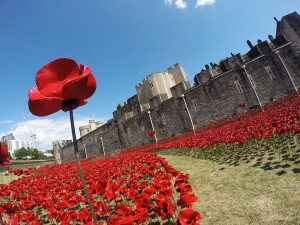What a week for extraordinary anniversaries. On November 11, in the UK and the Commonwealth we commemorate Remembrance Day (in the US, Veterans Day) – re 
But Sunday November 9 was also of course the 25th anniversary of the fall of the Berlin Wall. I’ve been watching youtube clips of the news reports from that electrifying night and remembering my disbelief, as a 19 year old who had just started studying Russian at university, that the closed border between East and West could be dismantled so suddenly, and so joyfully. This anniversary was marked by white balloons placed along the old border line, released into the night at the time when the confused East German border guards decided 25 years ago to open the gates and let people travel freely. From blood-swept lands – to hope and reconciliation.
By coincidence this week was also chosen by our colleagues at the MFA for NATO Week – where we, as NATO Contact Point Embassy together with Allies and MFA/MOD colleagues, spend a few days explaining to the Armenian public what NATO-Armenia partnership is and why both sides value it. But although the dates are a coincidence, I actually find myself this year making a connection between all of these events.
NATO came into being following the devastation of two World Wars – not to fight, but to prevent and deter war ever starting in Europe again. Together with the EU, these European projects have been amazingly successful at developing the values, trust and common purpose which reconciled historic enemies, defused militant nationalism and created the security bedrock for seventy years of prosperity.
When the Berlin Wall fell, NATO developed a new purpose – to look outwards and support the democratic transformation of Eastern Europe. The success of this transformation, and the extension of NATO’s role in humanitarian support and peacekeeping in the wider neighbourhood, has also led it to develop a far more complex and important agenda and network of partnerships with a much wider group of countries, including Armenia. But its core goal remains the same: through working together in the security sphere and supporting democratic values and civil/military reform, to support the spread of understanding, trust, and (therefore) security across the continent.
It has become very clear to me over the past three years that the Armenian government understands NATO very well, has no false fears or expectations, and that it feels confident about engaging with NATO in areas which are useful for its own process of defence reform.
The key themes of NATO’s partnership with Armenia are for me summarized by partnership in peacekeeping and promoting democratic values through civil-military reforms. These themes will, I hope, be reflected through our activities this week, and in the discussions with journalists, bloggers, students and schoolchildren which will take place throughout the week.
On peacekeeping, we will see the great work done by the MOD in developing a peacekeeping force trained to NATO standards. We will discuss how to build on this experience of working together (known as ‘interoperability’ in NATO jargon). I will also enjoy as always doing the TV bridges with the Armenian peacekeepers serving in Afghanistan and Kosovo, and giving their families a chance to say hello.
On democratic values, last year we focused on how to develop a culture of accountability and transparency (the ‘Building Integrity’ programme), but this year our focus is a roundtable with Ministries and NGOs on Armenia’s commitments under UN Security Council Resolution 1325, on women, peace and security. Armenia has strongly supported the UK’s initiative this year on Preventing Sexual Violence in Conflict, to deter, prevent and where necessary prosecute war crimes against women. Deputy Foreign Minister Hovakimian represented Armenia at the Summit we held in London in June and I know the ICRC in Armenia has been working closely with the MOD for some time on training peacekeepers on humanitarian law and the disproportionate impact conflict has on women.
But this resolution is also about involving women in building peace and security including by making sure that women are properly represented in the government, in parliament, in the police and in the military. I’ve spoken to women in these different areas and know that progress is being made. The first women graduated from Armenia’s officer cadet training programme this summer. It has taken the UK a long time to introduce women into a whole range of military roles – but we now have women serving in areas which we would never have considered 30, 20 or even 10 years ago. We now see it as entirely normal, for example, to have female officer cadets at our elite officer training institution, Sandhurst. It would be great to see the first female Armenian officer cadet at Sandhurst in the near future.
I hope NATO Week this year manages to tell some of the human stories behind the acronym and provides some food for thought on our partnership. The aim is to have a conversation, so please let us know your comments and questions.
